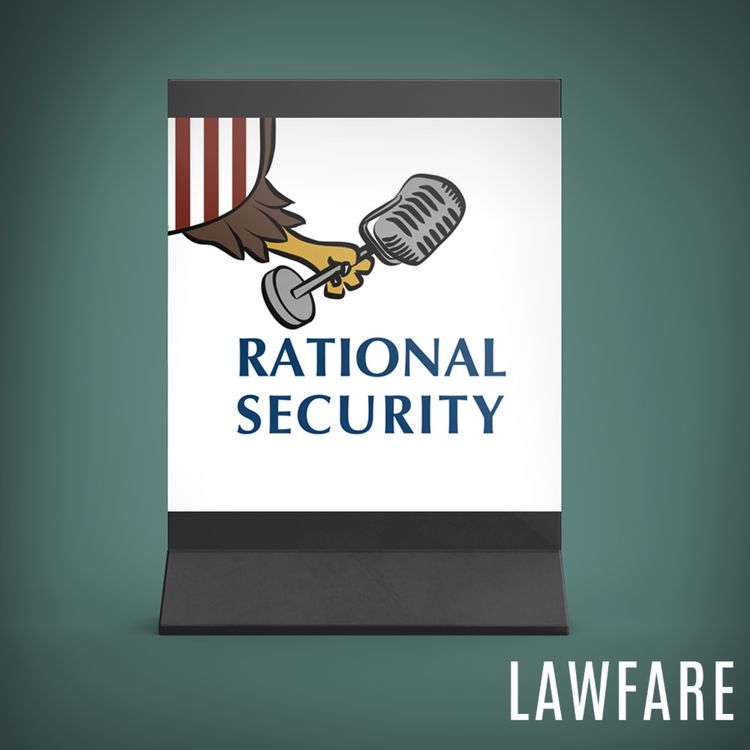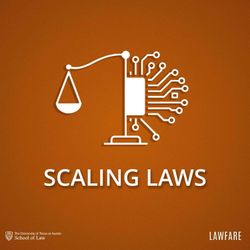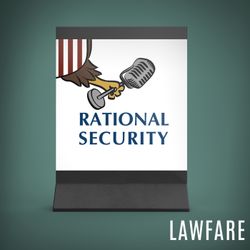Share

The Lawfare Podcast
Rational Security: The “Prison Rules” Edition
•
This week, Quinta and Scott were joined by Lawfare Managing Editor Tyler "Spicy Tyler" McBrien to talk through the week's big national security news stories, including:
- “Jack Smith Takes a Mulligan on his Big Swing.” A grand jury has re-indicted former President Trump for his actions relating to the Jan. 6 insurrection, after Special Counsel Jack Smith trimmed and massaged the allegations to accommodate the Supreme Court’s recent ruling on presidential immunity. How different is this indictment? What are the next steps in the trial? And will these new allegations have better odds of surviving Supreme Court review?
- “An Eye for an Eye Leaves the Whole World in a Bind.” This past week, Israel and Hezbollah traded another vicious round of attacks along Israel’s shared northern border with Lebanon, as part of the long-awaited response to Israel’s targeted killing of Hezbollah leaders a month ago. Now the region is waiting with bated breath to see whether this will be the end of it or the start of a larger war. How significant is the risk of escalation? And what will this mean for, among other things, ongoing ceasefire negotiations in relation to Gaza?
- “Send Me a Kiss by Wire.” Pavel Durov, the CEO of the Russia-based encrypted messaging platform Telegram—which, in addition to being the platform of choice in much of the world, has become a popular choice among criminals and terrorist groups due to its lack of content moderation—was arrested earlier this week in Paris, and is under questioning in relation to possible criminal charges arising from the criminal use of Telegram. What is motivating this move by French authorities?
For object lessons, Quinta recommended "When a Department Self-Destructs," Jennifer Schoenefeld's dramatic account of the in-fighting within Pomona College's English department. Scott threw his endorsement in (alongside the Academy's) for the beautifully mumblecore-ish film "Past Lives." And Tyler urged listeners to check out Tanya Gold's upsetting account of the commercialization of the Holocaust, tellingly entitled "My Auschwitz Vacation."
Note: Our discussion of Pavel Durov's arrest in France predated his indictment by French authorities.
More episodes
View all episodes

Scaling Laws: How AI Can Transform Local Criminal Justice, with Francis Shen
52:51|Alan Rozenshtein, research director at Lawfare, spoke with Francis Shen, Professor of Law at the University of Minnesota, director of the Shen Neurolaw Lab, and candidate for Hennepin County Attorney.The conversation covered the intersection of neuroscience, AI, and criminal justice; how AI tools can improve criminal investigations and clearance rates; the role of AI in adjudication and plea negotiations; precision sentencing and individualized justice; the ethical concerns around AI bias, fairness, and surveillance; the practical challenges of implementing AI systems in local government; building institutional capacity and public trust; and the future of the prosecutor's office in an AI-augmented justice system.Find Scaling Laws on the Lawfare website, and subscribe to never miss an episode.To receive ad-free podcasts, become a Lawfare Material Supporter at www.patreon.com/lawfare. You can also support Lawfare by making a one-time donation at https://givebutter.com/lawfare-institute.
Rational Security: The “Scare Them When They’re Young” Edition
01:17:22|This week, Scott sat down with his Lawfare colleagues Tyler McBrien, Michael Feinberg, and Ariane Tabatabai to talk through the week’s big news in national security, including:“Between Iraq and a Hard Place.” Iran is engaged in perhaps its most serious bout of domestic unrest in a decade, spurred on by a failing economy and the seeming political weakness of the regime after its devastating military conflict with Israel and the United States this past summer. But the regime has struck back viciously, cutting off global media and communications access even as it has engaged in a vicious and violent campaign of repression that may have already led to as many as between 2,000 and 12,000 fatalities. That has led, among other things, to threats from the Trump administration that it may intervene militarily against the regime. What should we be making of this development? What does it mean for the future of Iran, and what role might the United States play in that future?“A Slippery Slope.” ICE’s increasingly provocative immigration enforcement actions came to a violent head last week in Minneapolis, when ICE agent Jonathan Ross shot and killed driver and possible protest participant Renee Good. While the White House has sought to frame Good as a “domestic terrorist” who threatened Ross, videos of the incident instead suggest that her conduct came nowhere close to the standard normally required for the use of lethal force. The FBI is now reportedly investigating Good’s widow for ties to activist groups, an effort that led several career federal prosecutors to quit this week. How effective are the administration’s attempts to shape the truth likely to prove? “Green with Envy.” Diplomatic representatives from Denmark and Greenland are meeting with senior administration officials as we record to discuss a way forward on Greenland, the self-governing and all-but-independent Danish territory that President Trump has openly coveted since returning to office, up to and including the threat of military force to acquire it. How serious should the world take these threats? Where is the competition over Greenland likely to lead?In object lessons, Tyler is setting the mood with a recommendation of Way Dynamic’s album “Massive Shoe.” Mike is boosting our moods with a preview of “One Movie After Another,” a retrospective of Paul Thomas Anderson films, coming soon to the AFI Silver Theatre in Silver Spring. Scott is setting some mood lighting with his Xenomorph-like bedtime reading light from Glocusent. And Ari is getting moody with a revisit of Pedro Almodóvar’s “Pain and Glory.”To receive ad-free podcasts, become a Lawfare Material Supporter at www.patreon.com/lawfare. You can also support Lawfare by making a one-time donation at https://givebutter.com/lawfare-institute.
Lawfare Daily: Entrepreneurial Federalism and the New National Security, with Ashley Deeks and Kristen Eichensehr
42:36|On today's episode, Lawfare Senior Editor Scott R. Anderson sits down with Lawfare Contributing Editor Professor Ashley Deeks of the University of Virginia School of Law and Professor Kristen Eichensehr of Harvard Law School to discuss their recent article entitled, "Federalism and the New National Security," recently published in the Harvard Law Review.Together, they discuss the new ways that states are engaging in national security policy (which Deeks and Eichensehr call "entrepreneurial federalism"), the costs and benefits of such practices, and strategies for how the states and the various branches of the federal government should engage with them.To receive ad-free podcasts, become a Lawfare Material Supporter at www.patreon.com/lawfare. You can also support Lawfare by making a one-time donation at https://givebutter.com/lawfare-institute.
Lawfare Daily: The U.S. Foreign Service at a ‘Breaking Point,’ with John Dinkelman
28:47|On today’s episode, Lawfare Managing Editor Tyler McBrien sits down with John Dinkelman, president of the American Foreign Service Association (AFSA), to discuss his organization’s latest report, entitled, “At the Breaking Point: The State of the U.S. Foreign Service in 2025.” They talk about why AFSA undertook such a project after the federal government workforce survey was canceled earlier in the year, the report’s major findings, and why a robust foreign service is vital to U.S. national security.To receive ad-free podcasts, become a Lawfare Material Supporter at www.patreon.com/lawfare. You can also support Lawfare by making a one-time donation at https://givebutter.com/lawfare-institute.
Lawfare Daily: The Latest in Iran, with Richard Nephew
53:40|Iran is once again witnessing large-scale protests, on which the regime is cracking down through mass arrests and deadly force. President Trump has stated that the United States would come to the rescue of Iranians if the regime continues to kill protestors. Meanwhile, Tehran continues to reconstitute its nuclear program, which was damaged during the 12-day war over the summer. President Trump has threatened to eliminate Iran’s nuclear and missile programs if Tehran does not stop rebuilding its capabilities. Iran’s regional standing remains diminished, though its relationships with Russia and China continue even as tensions create limits to cooperation. On today’s episode, Lawfare Public Service Fellow Ariane Tabatabai sits down with Richard Nephew, Senior Research Scholar at the Center on Global Energy Policy at Columbia University and former Deputy Special Envoy for Iran, to discuss the latest developments in Iran, take stock of U.S. policy toward Iran during President Trump’s first year back in office, and offer indicators for what to expect next.To receive ad-free podcasts, become a Lawfare Material Supporter at www.patreon.com/lawfare. You can also support Lawfare by making a one-time donation at https://givebutter.com/lawfare-institute.
Lawfare Daily: The Trials of the Trump Administration, Jan. 9
01:40:30|In a live conversation on YouTube, Lawfare Editor in Chief Benjamin Wittes sat down with Lawfare Senior Editors Roger Parloff Michael Feinberg and Eric Columbus to discuss the shooting by an ICE agent in Minnesota, what the Maduro indictment means for the Alien Enemies Act cases, the disqualification of the U.S. attorney for the Northern District of New York, and moreYou can find information on legal challenges to Trump administration actions here. And check out Lawfare’s new homepage on the litigation, new Bluesky account, and new WITOAD merch.To receive ad-free podcasts, become a Lawfare Material Supporter at www.patreon.com/lawfare. You can also support Lawfare by making a one-time donation at https://givebutter.com/lawfare-institute.
Lawfare Archive: Former Ambassador Roberta Jacobson on the Mexico Presidential Election
45:12|From June 18, 2024: On June 2, Mexico held one of the largest elections in its history and the electorate voted in the country's first women, and Jewish, president, Claudia Sheinbaum. Sheinbaum was endorsed by outgoing President Andrés Manuel López Obrador (AMLO), who critics charge as pushing a series of anti-democratic policies including a substantial judicial overhaul. To discuss this historic election and what President-elect Claudia Sheinbaum may do in office, Lawfare Associate Editor for Communications Anna Hickey sat down with former United States Ambassador Roberta Jacobson. They discussed the issues voters were concerned about, political violence by cartels plaguing the country, and whether Sheinbaum will follow AMLO's trajectory as a populist or chart her own path. To receive ad-free podcasts, become a Lawfare Material Supporter at www.patreon.com/lawfare. You can also support Lawfare by making a one-time donation at https://givebutter.com/lawfare-institute.
Lawfare Archive: A Jan. 6 Committee Staffer on Far-Right Extremism
57:19|From February 15, 2023: The Jan. 6 committee’s final report on the insurrection is over 800 pages, including the footnotes. But there’s still new information coming out about the committee’s findings and its work.Last week, we brought you an interview with Dean Jackson, one of the staffers who worked on the Jan. 6 committee’s investigation into the role of social media in the insurrection. Today, we’re featuring a conversation with Jacob Glick, who served as investigative counsel on the committee and is currently a policy counsel at Georgetown’s Institute for Constitutional Advocacy and Protection. His work in the Jan. 6 investigation focused on social media and far-right extremism. Lawfare senior editor Quinta Jurecic spoke with Jacob about what the investigation showed him about the forces that led to Jan. 6, how he understands the threat still posed by extremism, and what it was like interviewing Twitter whistleblowers and members of far-right groups who stormed the Capitol.You can read Jacob’s essay with Mary McCord on countering extremism here in Just Security and listen to an interview with Jacob and his Jan. 6 committee colleagues here at Tech Policy Press.To receive ad-free podcasts, become a Lawfare Material Supporter at www.patreon.com/lawfare. You can also support Lawfare by making a one-time donation at https://givebutter.com/lawfare-institute.
Lawfare Daily: The Legal Fallout After a Fatal ICE Shooting in Minneapolis
40:57|Lawfare Senior Editor Anna Bower speaks with fellow Senior Editors Eric Columbus and Mike Feinberg about the fatal shooting of Renee Nicole Good by an ICE officer in Minneapolis. The discussion covers what is currently known about the incident and the conflicting accounts offered by DHS and the White House in contrast with bystander video. The panel also discusses DHS use-of-force policies, the federal government’s reported investigation of the shooting, and the legal framework governing state prosecutions of federal officers.To receive ad-free podcasts, become a Lawfare Material Supporter at www.patreon.com/lawfare. You can also support Lawfare by making a one-time donation at https://givebutter.com/lawfare-institute.